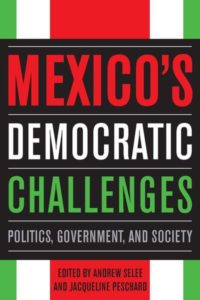Tens of thousands of people filled Mexico City’s vast main plaza Sunday (February 26) to protest President Andrés Manuel López Obrador’s electoral law changes they say threaten democracy and could mark a return to the past, France 24 reports (above).
There are two issues with the reform, Mexican election expert writes for The Conversation:
- The first is procedural: it was not negotiated with the main opposition parties, as past reforms had been, and it was not discussed fully following the usual legislative process in Congress.
- The second is its content and effects on INE. The reform limits INE’s ability to perform its duties, by changing its structure and legal power to keep political parties and candidates accountable.
Critics of President Andrés Manuel López Obrador worry a law passed last week is aimed at keeping his party in power in presidential elections next year by weakening Mexico’s election agency. The electoral legislation has alarmed both Mexico’s opposition and members of the U.S. Congress, The Post’s Mary Beth Sheridan notes:
 “By approving President López Obrador’s proposal … the Mexican Congress has imperiled the future of its country’s democratic institutions,” the chairmen of the House and Senate foreign relations committees – Rep. Michael McCaul (R-Tex.) and Sen. Robert Menendez (D-N.J.) – said last week. “Returning Mexico to its dark past of presidentially controlled elections not only sets the clock back on its democracy, but also U.S.-Mexico relations.”
“By approving President López Obrador’s proposal … the Mexican Congress has imperiled the future of its country’s democratic institutions,” the chairmen of the House and Senate foreign relations committees – Rep. Michael McCaul (R-Tex.) and Sen. Robert Menendez (D-N.J.) – said last week. “Returning Mexico to its dark past of presidentially controlled elections not only sets the clock back on its democracy, but also U.S.-Mexico relations.”
Hollowing out Mexico’s federal institutions would allow the well-funded drug cartels to gain even more of a grip on the country and return Mexico to the system of corrupt one-party rule, and rigged elections, that blighted the country for most of the 20th century, adds Financial Times columnist Gideon Rachman:
In Mexico last week, I found virtual unanimity among academics, businesspeople and political commentators that the country’s democracy is now in real danger. “Amlo has a done a lot of bad things,” remarked one prominent businessman, “but this is the worst, the most dangerous, by far.”
López Obrador himself is unlikely to benefit directly from these changes. The Mexican constitution limits presidents to a single six-year term in office, and it is widely assumed that he will step down next year. But he is likely to handpick his successor by choosing the presidential candidate for his party, Morena. His electoral “reforms” could then help local Morena officials to fix elections.
Greetings to all from an extraordinary march in Mexico city – tens of thousands of people chanting the name of…the National Electoral Institute. Which is under threat, from the president. Beginning to be a familiar story pic.twitter.com/9ukxEiYdHB
— Anne Applebaum (@anneapplebaum) February 26, 2023







